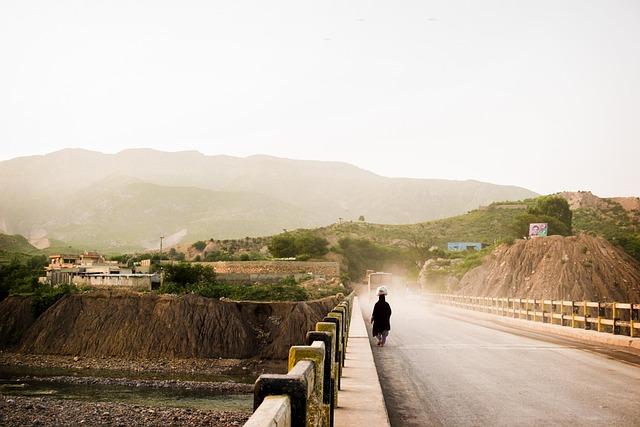Title: Navigating the Complex Landscape of Security in Pakistan
In a world increasingly defined by interconnectedness yet overshadowed by divisions, few places illustrate the intricate dance of security dynamics as vividly as Pakistan. Situated at a crossroads of historical tensions and emerging opportunities, the nation presents a multifaceted tapestry woven from threads of geopolitical interests, internal challenges, and societal resilience. From the bustling streets of its urban centers to the rugged terrains of its border regions, the intricacies of Pakistan’s security landscape are shaped by a myriad of factors—both local and international. As we embark on this exploration, we will traverse the diverse landscapes of threats and strategies, uncovering the underlying narratives that inform the present-day security discourse. In doing so, we aim to illuminate the paths that Pakistan is forging toward stability and resilience in the face of an ever-evolving threat matrix.
Understanding the Multifaceted Security Threats in Pakistan
Pakistan’s security landscape is characterized by a myriad of threats that are as diverse as they are complex. Terrorism, both domestic and transnational, remains a significant concern, with various militant groups exploiting regional instability and socio-economic grievances. The rise of radical ideologies has led to an increase in violent incidents, notably affecting urban centers and border regions. Additionally, ethnic and sectarian conflicts continue to fuel tensions, complicating the efforts of law enforcement agencies to maintain order and ensure public safety. These challenges are not only exacerbated by the geographical intricacies of the country but also by political instability, which can create power vacuums that extremists are quick to fill.
Moreover, the cyber threat landscape in Pakistan is evolving as technological advancements introduce new vulnerabilities. With a growing reliance on digital infrastructure, both state and non-state actors are increasingly capable of launching cyber-attacks that can disrupt essential services and compromise national security. The threat of cross-border tensions, particularly with neighboring India, further adds to the precarious situation, leading to military skirmishes and escalating rhetoric. In response to these multifaceted threats, Pakistan has been compelled to adopt a more holistic security strategy, prioritizing intelligence-sharing, community engagement, and regional cooperation to address the root causes and ramifications of insecurity effectively.

The Role of Political Stability in Shaping National Security Policies
Political stability serves as the cornerstone of effective national security policies, particularly in a country like Pakistan, where external threats and internal challenges intertwine. A stable political environment enables government institutions to operate efficiently, ensuring that security frameworks are not only developed but also implemented effectively. When the leadership is stable, there’s a consistent vision regarding national priorities, which in turn fosters public trust and cooperation. This unity can lead to comprehensive approaches that address a spectrum of security concerns, from counterterrorism to border security, and enhance the overall resilience of the nation.
Moreover, the interplay between political stability and security encourages international partnerships, essential for sharing intelligence and resources. Countries are more inclined to collaborate with nations that exhibit robust governance and political cohesion. In Pakistan, the potential for strategic alliances significantly hinges on its political climate. An effective security policy should, therefore, integrate diplomatic efforts alongside military strategies, ensuring that Pakistan can strengthen its global standing while maintaining internal peace. Factors such as responsive governance, public engagement in security discourse, and proactive legislation shape a resilient framework that can effectively adapt to the evolving complexities of national security.

Community Engagement and Grassroots Initiatives for Enhanced Safety
In the intricate tapestry of securing communities in Pakistan, local initiatives are emerging as vital threads enhancing the overall fabric of safety. Residents are increasingly taking matters into their own hands through community watch programs and awareness campaigns aimed at educating citizens about personal safety and crime prevention. These grassroots efforts not only empower individuals but also foster a sense of unity, encouraging neighbors to look out for one another. By establishing strong lines of communication and trust, these initiatives create informal networks that help deter crime before it occurs.
To further bolster these community-driven efforts, local governments and NGOs are beginning to collaborate more closely, integrating resources and expertise. This collaboration often takes the form of workshops and seminars that address pressing local safety issues. For instance, citizens can engage in discussions about emergency preparedness or learn conflict resolution skills that minimize potential confrontations. Additionally, educational materials are distributed that highlight the importance of vigilance and reporting suspicious activities. The result is a cohesive community, equipped not only with the knowledge to act but also the empowerment to transform their neighborhoods into safer havens.

Leveraging Technology and Intelligence for Improved Security Frameworks
The integration of advanced technologies and intelligent systems into security protocols is a pivotal element in addressing the multifaceted threats faced in contemporary Pakistan. Cutting-edge solutions such as artificial intelligence, big data analytics, and smart surveillance can significantly enhance situational awareness and response times. These technologies enable security agencies to identify patterns, predict potential threats, and respond effectively. Organizations are increasingly relying on:
- Facial recognition systems for proactive monitoring in urban areas.
- Data-driven insights to deploy resources more efficiently.
- Blockchain technology for secure data transactions.
Moreover, establishing strong collaborative frameworks between government bodies, private tech firms, and academic institutions can foster innovative solutions tailored to local challenges. Training security personnel to utilize these technologies effectively is crucial. Implementing continuous education programs and knowledge-sharing initiatives can elevate operational efficacy. Below is a concise overview of the technologies currently shaping security frameworks:
| Technology | Application | Benefit |
|---|---|---|
| Artificial Intelligence | Threat assessment | Enhanced predictive capabilities |
| Big Data Analytics | Data processing | Improved resource allocation |
| IoT Devices | Surveillance | Real-time monitoring |
In Retrospect
As we conclude our exploration of the intricate security landscape in Pakistan, it becomes evident that navigating this multifaceted terrain requires a nuanced understanding of its historical context, geopolitical dynamics, and socio-economic factors. The interplay of internal and external challenges shapes not only the immediate security policies but also the broader narrative of national resilience and identity.
In a country rich with cultural diversity and potential, the path towards stability is laden with both obstacles and opportunities. It is essential for policymakers, citizens, and the international community to engage in informed dialogue and cooperative strategies that reflect the complexities of this vibrant nation.
As we move forward, let us embrace a future where understanding, collaboration, and proactive solutions pave the way for a more secure Pakistan, ensuring that the aspirations of its people take precedence on the road ahead. After all, the journey towards security is continuous, and the commitment to overcoming its challenges is what truly defines a nation.



